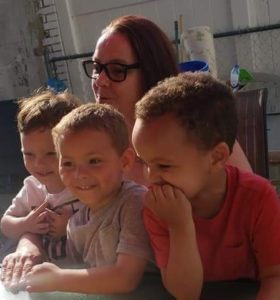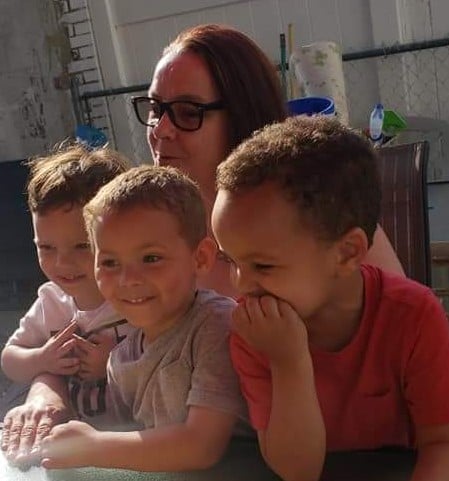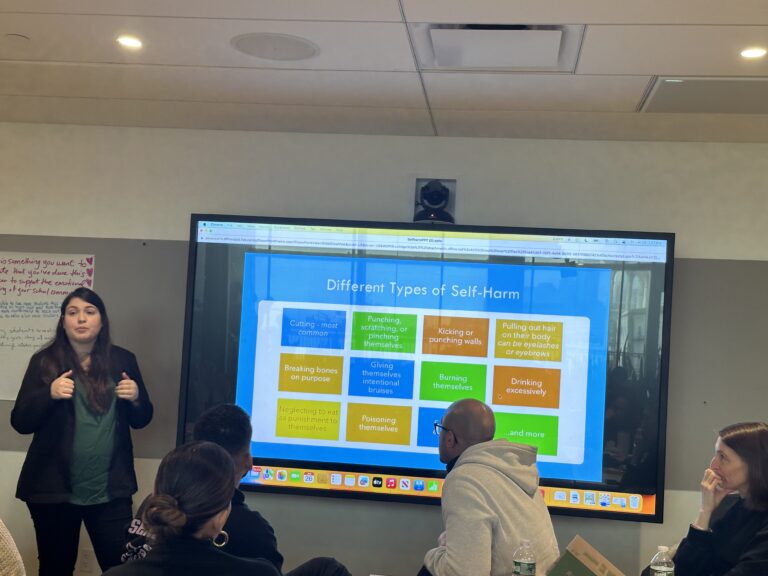Tips for Grandparents Who Are Primary Caregivers
By Michele Neuhaus, Director, 0-5 Early Childhood Mental Health Initiative
 September 9 is Grandparents Day, one of those holidays that’s seen as cluttering up the calendar and a ploy by the greeting card industry. It shouldn’t be.
September 9 is Grandparents Day, one of those holidays that’s seen as cluttering up the calendar and a ploy by the greeting card industry. It shouldn’t be.
In my line of work, I see a lot of families in which, for a variety of reasons, parents are unable to care for their young children, and it’s the grandparents who step in to fill the role of primary caretaker. According to census figures, 2.7 million grandparents nationwide are raising grandchildren, up 7 percent from 2009. It’s the epitome of unconditional love they are showing for both their children and grandchildren; it’s a truly wonderful thing.
Wonderful, but not necessarily easy. Usually in their 50s, 60s, or older, these grandparents might not have the same level of energy they had the first time around. Many are living on fixed incomes and might have to raise more than one grandchild with very little help. At a time in their life when they figured they might be able to relax a little more, it’s like they’re starting all over again. This is especially true when the grandchildren they’re raising are very young.
In honor of these selfless parent figures, I want to mark Grandparents Day this year by sharing seven tips to make this crazy, unexpected, daunting, and wonderful time in their lives just a bit easier. These tips were made with grandparents raising young children in mind, but some of the concepts can be adapted for older kids.
- Realize you can do it differently this time. Parents always seem to feel like they’re responsible for everything their children do—especially when they make mistakes! So when your child is unable to care for her child, it’s not unusual to feel like it might be your fault—that if you raised your child better, you all wouldn’t be in this situation. The truth is, like most parents, you probably did the best you could at the time. Maybe you didn’t always make the best choices. But it’s also possible that you didn’t have the tools to raise your child the way you wanted to, and now you do. Think about what you want to correct and how you can do it differently this time. You are not doomed to repeat the same mistakes—nobody is. Let go of the guilt and shame and focus on what you did right (there’s more than you think!), and what you can do right this time.
- …and that you really do have the tools to handle this. If you last raised a child in the ‘90s, it’s true that a lot has changed (hello, social media!). But it’s also true that you have more tools at your disposal to help you through. You can research issues online or talk to your grandchild’s teacher or pediatrician for guidance. And you can rely on the tools that you’ve developed throughout the various stages of your life. For example, most caretakers find it frustrating when a child won’t listen to reason or is undermining their authority. But remember: You deal with difficult people every day! How do you deal with a colleague at work who is acting that way? The tools that help you navigate those situations are the same ones you can draw on when dealing with your grandchild—really! Take a deep breath, try to separate out your feelings, and draw on the tools you’ve built up in your arsenal after years of being an adult in the real world.
-
Re-learn Patience. Young children are naturally curious, and they ask a lot of questions. They constantly go off task, need a lot of direction, and can throw major temper tantrums when they don’t get their way. Dealing with this takes patience! It helps to consciously acknowledge that you will need to re-learn the kind of patience that raising young kids demands. This may mean taking a deep breath and giving yourself a few moments before you speak in a difficult moment, because the last thing you want to do is reward misbehavior. The more attention you give children for misbehaving—even if it’s negative attention—the more likely they are to repeat the action. That’s why one of the best strategies is what I call “ignore and redirect.”
Try to ignore the bad behavior if you can safely do so. If you can’t, redirect them to another activity.When you know a situation is going to try both your and your child’s patience, prepare ahead of time. This requires more work, but it is more likely to result in a less frustrating experience. For example, if you need to take your grandchild to a doctor appointment, tell your grandchild beforehand what to expect: that you’ll likely be in the waiting room for a while, and that that will give him some time to engage in an activity he enjoys. Then ask him what he’d like to bring along to do while waiting. In that way, you’re setting him up for success. If he behaves well, make sure to notice (e.g., “I noticed you played very nicely with your coloring books while we waited in the doctor’s office. And we waited a really long time! You showed a lot of patience. Which picture do you want to hang on the fridge?”).
Of course, despite your best efforts, sometimes a tantrum will ensue anyway. Try to look at each one as a teachable moment (I know, it’s hard, but here’s where that patience comes in!). Young children may not know themselves why they’re acting up. They lack the ability to say, “I’m bored” or “I’m angry” or “I need love right now,” and that’s why I’m behaving this way. It’s up to you to teach him to recognize those feelings and put a name to them. Talk through the behavior to help them understand—they usually will get there!
- Organize. There’s a lot to do when you’re raising young children. It helps if you organize your days and weeks. Start the week with a to-do list, make a dinner (and food shopping) schedule, and plan out your week. It’ll be more work up front, but it will make you feel less frazzled—and when you’re less frazzled, they’re less frazzled.
-
Take care of yourself—and don’t feel guilty asking for help. Sleep. And reach out to your support system. Is there a grandfather in the picture? Aunts or uncles, close friends? Don’t feel bad asking them for help when you need it. People close to you will understand, and most are happy to help. Take advantage of supervised visits that your grandchild has with her parent. Instead of staying for the visit, go for a walk, run an errand, or do something else you’ve been wanting or needing to do; it’ll be good for both of you. Also consider enrolling your toddler or preschooler in day care or preschool. Kids start much earlier now, and with good reason: it’s beneficial to their social and academic well-being (if you need convincing, read “Jessica’s Story” or watch this video that portrays a day at Head Start). If you live in Queens or Manhattan, check out The Child Center of NY’s Head Start and Early Head Start programs and feel free to contact us to find out if your family might qualify. If you do, cost is based on family income. We never turn away a child for inability to pay.
Equally important, if you find yourself feeling really overwhelmed, consider seeking support for yourself in the form of support groups, individual or family counseling (including our 0-5 Early Childhood Mental Health Initiative, which supports the whole family), or other family support options. Most of these resources are free or on a sliding scale. And just because you seek help once doesn’t mean you’ll have to be in therapy forever. I see a lot of grandparents who are with us for just a few months, while they find their sea legs. Our goal is to offer guidance and support that will help you parent confidently on your own.
- Acknowledge your feelings. It takes a lot to make that commitment to start parenting all over again. It’s OK to feel like you should be hanging out playing mah jongg instead, or sometimes feel resentful that you have to be disciplinarian (again!) instead of being the grandparent who gets to spoil the grandchildren. Feeling that way sometimes doesn’t mean you don’t love your grandchild. Be open with yourself about your feelings, or they’ll boil over and come out in your relationship with your grandchild.
- Have fun with your grandchild. Acknowledge and savor the good feelings, too! There is so much joy in being with children—and as you know from experience, it goes by so fast. So take in the daily experiences. Spend time not worrying about tomorrow and just revel in the joy of being with kids—the funny things they say, the silly way they laugh, the way they skip when they’re happy. Do things you love with your grandchild.
As my client Mariann (pictured above, with her grandchildren) remarked, “Although sometimes it’s a challenge keeping up with two very active 4-year-old little boys, I would not trade it for anything. I love all three of my grandchildren with my heart and soul. … When things get difficult, I try to keep in mind to do what’s best for them. They rely on me. All of the fun, the good times always outweigh the challenges!”





